#dave rempis
Explore tagged Tumblr posts
Text
Rempis / Adasiewicz / Abrams / Damon — Propulsion (Aerophonic)
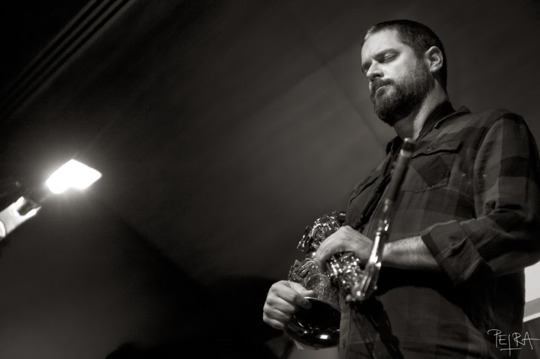
The title of this recording is apt. Saxophonist Dave Rempis, vibraphonist Jason Adasiewicz, bassist Joshua Abrams, and drummer Tyler Damon sustain direction and momentum throughout its three lengthy tracks, which are excerpted from a concert that transpired on August 31, 2023 at Elastic Arts in Chicago. But it could just as easily be called Cusp, since it captures the precise moment when the quartet’s leader transitioned from one career phase characterized by intense community engagement to another that will focus upon articulating a mode of improvisational music-making that’s taken decades to develop.
Besides his dogged work as a musician and label proprietor, Rempis is an indefatigable organizer. He’s had a strong hand in the production end of the Hyde Park Jazz Festival and Pitchfork before that, and for 21 years he ran a weekly concert series presenting improvised music for the Elastic Arts Foundation. The latter affiliation came to an end the night that this music was played, when Rempis booked himself to play the final concert of his tenure with Elastic Arts. It fell on the same weekend as the Chicago Jazz Festival, which has often been an occasion when he would choose to play with one of his more enduring ensembles in some smaller venue after the main festival closes for the night. But this time he picked a new combo, albeit one with deep roots. Rempis, Adasiewicz, and Abrams are part of a cohort that came onto Chicago’s jazz scene in the 1990s, and they’ve been appearing on records together in varying combinations for nearly two decades. Damon and Rempis have been frequent collaborators since 2017, when their trio Kuzu (with Tashi Dorji) was first born on Elastic’s stage.
This web of associations is key to the character of the music on Propulsion. Everyone here understands what Rempis is after, and knows how to make it happen. The essence of his aesthetic is a convergence of the micro and macro. He’s committed to total improvisation. The music is made in the moment that is played, and the selection of personnel is his chief compositional decision. But that’s still very much a compositional act, since Rempis wants his improvisations to develop cohesive forms shaped by the imagination of every contributor. Even an unaccompanied passage, such as the incandescent, circular breathing-fueled four-minute line drawn by Rempis’ alto that opens “Egression,” is simply part of a larger, collectively conceived work. While his keening instrumental voice pushes forward, a calmer vibraphone melody wreathes it, and a seething maelstrom of bowed bass and Sisyphean drumming first fuels the progress and then resolves it as the music gently lands night quite fourteen minutes later.
Music like this doesn’t work unless all parties involved are tuned into each other from moment to moment. But it also requires musicians with sufficient recall where the music has recently been to make contributions that make sense as part of a larger developmental arc. While nothing quite matches the experience of being present when such music is being willed into existence, Propulsion comes close enough to deliver the feeling as well of the sound of committed co-creation.
Bill Meyer
#dave rempis#jason adasiewicz#joshua abrams#tyler damon#propulsion#aerophonic#bill meyer#albumreview#dusted magazine#jazz#elastic arts foundation#total improvisation
6 notes
·
View notes
Text
youtube
Earscratcher - Sugar Maple, MKE December 8, 2024
Dave Rempis - saxophones
"Lisa Arnik" - piano
Fred Lonberg-Holm - cello
Tim Daisy - drums
video by Bragmilwaukee
0 notes
Text
Ibelisse Guardia Ferragutti & Frank Rosaly Interview: Knowledge and Dignity
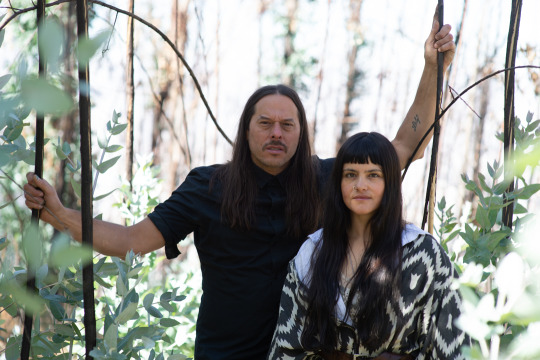
Photo by GUMO
BY JORDAN MAINZER
When I log on Zoom to interview creative and life partners Ibelisse Guardia Ferragutti and Frank Rosaly, I expect to see them together. Instead, Ferragutti's at their home in Amsterdam, and Rosaly's camera is set up somewhere outside, but he's not there at all. (The Zoom active speaker view keeps on highlighting him because birds are chirping.) As I introduce myself to Ferragutti, Rosaly eventually shows up, and they explain to me that he's at a house in the forest they share with friends. The contrast between the two locations--personal and internal, earthbound and communal--fittingly mirrors the dichotomy of what I'm there to ask them about, the stunning MESTIZX (International Anthem/Nonesuch). Ferragutti and Rosaly's new album represents the first time either artist publicly confronted aspects of their Latin heritage. It's also their first record at all. Even Rosaly, the prolific experimental music drummer who has played with everyone from indie rock lore like Thurston Moore and Ryley Walker to jazz stalwarts such as Dave Rempis and Matana Roberts, has never made anything that sounds quite like MESTIZX, and only ¡Todos de Pie!, his project exploring the music of Puerto Rico through improvisation, came close to touching the record's layered themes. Nonetheless, Ferragutti and Rosaly have managed to dive deep into complexities while finding a collaborative artistic voice.
The word "mestizx" is a non-gendered word of "mestizo" or "mestiza", the Spanish colonial term for mixed race, an identity the duo owns and turns upside down with MESTIZX. Ferragutti was born in Bolivia and is of Bolivian and Brazilian heritage, countries colonized by Spain and Portugal, respectively. The majority of the modern Bolivian population identifies as "mestizo," a mix of Indigenous and European heritage, of the colonizer and the colonized. It's this in-betweenness that Ferragutti wished to dissect on MESTIZX, a feeling beyond simply growing up with the music of the Bolivian and Brazilian diaspora. Rosaly, meanwhile, is of Puerto Rican heritage but wasn't allowed to speak Spanish outside of his home during childhood, as his parents wished to assimilate him as much as possible to the English-speaking United States. Before he became the dynamic, noisy drummer he was today, he fell in love with percussion and first connected with his roots when watching another drummer of Puerto Rican heritage perform, the late, great Tito Puente. The sounds on MESTIZX touch on all of these musical traditions and more, intensely reflective.

Photo by GUMO
Yet, Ferragutti and Rosaly's approach is also immaculately researched and respectful. Both artists went to school for music; though the songs on MESTIZX are anything but traditional, they reflect Ferragutti and Rosaly's deliberately academic exploration of music-making. They took the time to understand the ritualistic and cosmological context of each included instrument and rhythm before connecting it with modern-day ideas of decolonization and protest via Ferragutti's lyrics. That is, whether it's the impossibly wide array of percussion instruments from all over the world or Ferragutti's synthesizers effected to sound like pan flutes, everything on MESTIZX is included for a reason. "I didn't go thinking on this record, 'I want to use African instruments.'" Rosaly said. "When we were first starting to play around with instruments in the living room and hanging out, the mbira was around, and I came up with this little harmonic sequence, and things started landing on top of that instrument. I had to ask myself, 'I love the sound, of course, but am I using it for reasons that are dignified for the instrument and its lineage without appropriating?" Rosaly studied the way in which the African diaspora was embedded in Puerto Rico. "That musical and spiritual ideology traveled," he said. "Suddenly, the mbira had a place for me."
As much as MESTIZX sounds on paper like an ethnomusicologist's favorite new album--just take a look at the album's immersive liner notes--Ferragutti and Rosaly emphasized to me that the actual qualities of the songs are exemplary of the two's past musical influences and contemporary artistic community. Rosaly's history in the Chicago post-rock and jazz scene shines through, making a song like the album's title track, full of wiry guitars, an orchestra of synthesizers, and Ferragutti's captivating vocals, earn its pitched-to-me would-be-ridiculous descriptor of "Elza Soares fronting Hail To The Thief-era Radiohead." Moreover, on each song, the two solicited contributions from a who's who of contemporary experimental musicians, from bassist Matt Lux and cornetist Ben LaMar Gay to guitarist Bill MacKay and multi-instrumentalist Rob Frye. It's a testament to the collective's creativity how natural, often groovy, and cohesive the songs sound, despite each's long list of players, many of whom play multiple instruments per tune. On lead single "DESTEJER", Ferragutti differentiates between being intertwined with her roots and being suffocated by them, singing, translated from Spanish, "The present conjures the past that informs the future / I dodge the trap / I am not raw material." Her words form a push-pull with the clattering percussion, courtesy of Rosaly and Mikel Patrick Avery's tambourine and caxixi, and the woodwinds that alternate between flutters and smooth expressions, demonstrating the tension within.
Ultimately, the next step for Ferragutti and Rosaly is where the songs on MESTIZX go from here. Right now, they're exploring them in a live setting, on tour in Europe with Lux, Gay, multi-instrumentalist Ben Boye, and pianist Marta Warelis. Before embarking on tour, the two rehearsed simplified versions of the songs themselves, but just like the record, the songs will become fully fleshed only when the duo invites their friends on stage to help them along the way, participating in the modern-day ritual of playing music, a full circle return to the rituals Ferraguti and Rosaly studied to prepare to make the album. "The medium of the record is one thing, and songs need to be certain lengths for them to stay buoyant," Rosaly said. "Having a whole family of magical people we can tour with in different contexts, the music is going to open up in very unforeseen ways."
Below, read my conversation with Ferragutti and Rosaly, edited for length and clarity. We talk about MESTIZX, the album's art and videos, roots, colonialism, and Chicago post-rock.
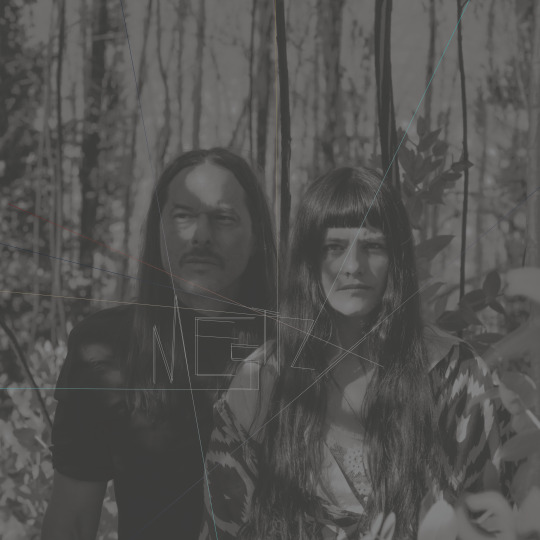
Since I Left You: Reading about the ideas and story behind MESTIZX, it's clear the issues of identity it deals with are things the two of you have been grappling with for a long time. Why was right now the time you decided to sit down and make this album?
Ibelisse Guardia Ferragutti: In my case, it's been something I've been dealing with my whole life. I've felt a super loud presence of my roots and realized not everybody where I come from had that. It was almost a burden, a curse. [laughs] But also totally not and really beautiful. It had a big influence in a good way and sometimes in not such a nice way, to the point I had to do something with it. I didn't know exactly what ["it"] was, so I let it go, but the moment I really faced ["it"] through music, I allowed for a lot of healing in terms of my relationship to my roots, the painful parts of my roots, and the beautiful parts of my roots. I also [have] a lot of connection with people, rhythms, and the pain of what it is to come from places so deeply colonized.
I just read an article that somebody wrote in Germany [about MESTIZX], and they called it a bit of a self-help record. [laughs] I don't know, I think it's more than that for me. It's not just about me. It's about something we share as a collective intelligence, where we're at in this moment, in the South American diaspora.
Frank Rosaly: [Self-help] sounds like a bit of a simplification of the context of the record. I started thinking about this stuff around 2006. I had a pretty disconnected relationship with Puerto Rico, by design. My parents kept me as integrated as possible to my benefit. I don't necessarily identify as being Puerto Rican outright. When Ibelisse and I met and began our partnership, being in partnership with a Latina really opened a dialog that was never really so open in my life. That's when things really shifted into high gear in dealing with some of the themes you hear about on this record.
SILY: What about during the process of writing or recording or playing with others? Did your relationship to your roots change?
FR: For me, it deepened things. Since Ibelisse is the guardian of the lyrics, and I'm oversimplifying things here, but I'm creating content from the musical side of things--we're both doing that of course--the rhythms that come from certain regions and all of my research, studies, and interest in that material had a place. Before that, playing with Ryley Walker, it didn't make sense to throw some bomba in there. All of a sudden, this incredible amount of something from within became dislodged and able to move through me and the music, that I hadn't given a lot of space for. I've only been in one project that I created myself, ¡Todos de Pie!, that began to talk about this and research this a bit. This project really set it all free, and it became a waterfall.
IGF: For me, I think it was a really beautiful and intense process, to confront my own biases. I studied classical piano, have done a lot of punk music, and realized in my education, by default, even growing up in South America, I wasn't in contact with the music of the territory, with the real roots. The process of this music was so deep that I started talking with a lot of people and doing a lot of research about how much by design you are already given this very Western idea of listening to, making, and belonging to music. I felt so sad that in my country, we never had enough power to appreciate what we already had there. It's stunning, the most beautiful drum music I've ever heard. It sounds self-helpy, but it's not: It was a big healing process of reconnecting with deeper layers of instruments that belong to a territory. Pan flute, I just see it in the main squares, people playing it in the street, but it's actually a very powerful instrument when put in its right context for its right ritual and purpose. For me, it was a really big journey to go really deep and really dare to listen to things I couldn't listen to before. Even if I don't use the pan flutes, to have a reverence for where my ancestors come from and have a space to listen. The magic embedded in those rituals is out of this world. It's like they're people from the stars. I can't explain the whole thing--it's like a whole book--but I was so stunned by the cosmologies of the people from those territories. This record brought me there, and I'm very, very thankful for that.
SILY: Your average music listener might not think about the fact that an instrument, rhythm, or sound can have its own proper sociohistorical context independent of the sheer quality of how it sounds. Were you hoping to further educate listeners with this record?
FR: I wouldn't go as far as to say "educate." At the end of "BARRO", there's panderetas being played, and it's not some sort of reference or a shoutout, as in, "Here's a little Puerto Rican tidbit." It really has a place in the song because of what the song is talking about and what we're trying to invoke. I found it imperative; there's an urgency for that to happen. When we started making the record, we weren't trying to make a Latin-feeling record--we both tend to make pretty noisy, experimental stuff--but because of the content of the record and what's really happening inside of the music, it informed us to make a different decision as to how the music can be carried by song, flow from song to song, to make a record and an entire story. I've never thought this deeply about all the connective tissue and the meaning of everything on this record. Nothing is put in place, like, "A shaker would be nice!" A shaker is there because it really needs to be there, not just on a musical level, but because of the message.
IGF: I feel like I am a bit more educated; I'm going to start by educating myself. I can communicate to other people. I don't feel like I'm allowed to play a pan flute or anything like that. I know much more now than what I knew before, but that knowledge and dignity I felt making the record is embedded in the music by default, by the way I talk about things, choose this word or that sound. It has to do with a repercussion of understanding the dignity of those instruments in the territories they are made and played: agricultural reasons, cosmological reasons. That knowledge is so inspiring, it helped me decide how to make this record. The record is a reflection of what I learned.
SILY: What determined what language each song was in?
IGF: I think it had to do with the sound. We built "MESTIZX" like a singer-songwriter [song,] and it just came out in Spanish, naturally. Some songs started from the lyrics towards the instrument, others from the drums towards words. At a certain point--and with the help of Frank--I was listening so openly, the song would tell you what language it needed to be sung in. “SABER DO MAR”, the second song of side B, is often translated in the reviews as "Know the Sea", but it's actually "The Knowledge of the Sea". I was thinking that all of these people came from the Africas to Brazil and informed so much music and brought their instruments, gods, and belief systems. I was really inspired by the language carried in that diaspora between Africa and Brazil, which is the colonizer language, which is Portuguese. The sea brought all of these languages to Brazil, and to Bolivia. The last two [songs] in English...I think it has something to do with this "mestizx" thing. I communicate nowadays in English rather than in Spanish or Portuguese. I didn't grow up with it, but I use it so much it's embedded in how I think, how I feel, how I communicate with my love, Frankie. We just communicate in English. Frankie doesn't understand Spanish or Portuguese, so English is our bridge. English is a powerful medium for this record, in terms of all of the voices that live within us.
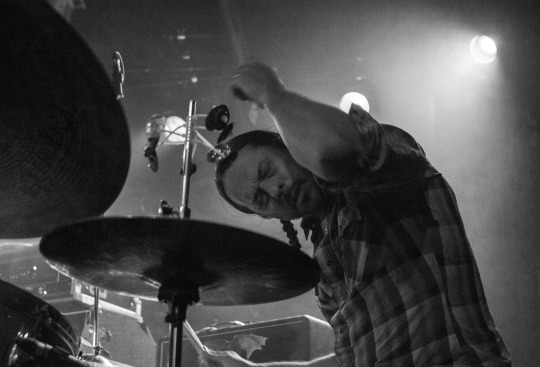
Photo by Saskia Ludden
SILY: Frank, in terms of music where you come from, how would you say Chicago post-rock informed this record?
FR: I would argue that the fabric of how I think about playing is woven almost strictly from my experiences in Chicago and the music that brought me there in the first place, which dislodged me from a weird path of institutional jazz learning and going to school. I heard Sam Prekop's first solo record with Chad Taylor and Joshua Abrams, then I heard Isotope 217, then Tortoise. I was in Arizona at the time, then I moved to L.A. for a while. I was really in a bubble before that. Suddenly, everything changed because of that sound. It's not any particular artist. They've all influenced me in so many ways. Not necessarily, "I'm going to play like Dan Bitney now because I love that sound," but the principal of how Dan Bitney fits in Tortoise, and how John Herndon sounds in Isotope, and the melodies that Rob Mazurek makes. [Mazurek] plays a lot of intervals in 4ths, which I fell in love with when I was in college composing, but then I was exposed to it in a new context which made me crazy. You hear 4ths everywhere in this record, which is because of Charles Ives by way of Rob Mazurek by way of Gastr del Sol and the free jazz and improvisational lineage from Chicago, from the Art Ensemble of Chicago to what's happening even now. It's all in there.
SILY: From a broad perspective, there seems to be a contrast in textures and moods in every song. Was that a goal, to have tactile instrumentation going on at the same time as something broad and expansive?
IGF: From my point of view, I don't know if it was a strategy as much as my listening inside the moment, which is of course a strategy. [laughs] For me, playing with synthesizers is a really nice way to speculate folkloric instruments. I would tune the synthesizer in different ways to make it have the same tuning as a pan flute. The electricity of the synthesizer had to be there because it's a medium that makes a lot of sense to tie the ancestral with the futuristic, to break through space and time. I was also thinking about whether I should sing or use words because [that way is] less post-rocky--I'm also super inspired by post-rock [laughs]--there was something bigger happening in terms of the palette of the sounds. My voice became a kind of instrument, so to say.
FR: I would argue another part of how I think about things has so much to do with that old version of myself when I was in school, learning about classical percussion and the percussion family. It's such an incredibly huge family of instruments that span across the world. They're all a part of my life, because I've studied them and they mean something to me. If I [use] a pandeiro from Brazil, it's not necessarily just because Ibelisse is speaking in Portuguese, or because it has anything to do with Brazil, but because it's the right sound.
SILY: Did you have specific people in mind you wanted to play on certain songs on the record?
FR: The first person we were thinking about was Matt Lux, because of his sound. I had worked with him on another project where he was the producer. The way he thinks about sound and very gently produces--he just says a few things and lets it sink in--he has a way of being very subtle about helping artists like Ibelisse and I move deeper into the music. We just wanted him around and then said, "Dude, you gotta bring your bass and play a little bit." He had always joked about being in retirement. Luckily, that's not the case. The last time I was in Chicago, I was supposed to do a recording session with Rob Frye and Ben LaMar Gay, and I got really ill. I really love their sound, [so I asked them]. Bill MacKay, I love that guy so much, he's been such a huge inspiration as a human being, let alone a musician, so we wanted to see whether he could arrive and play a few notes.
IGF: We also had some songs with guitar and thought his sound was really unbelievable. Avreeayl Ra is really amazing. Mikel Patrick Avery. There are so many.
SILY: Bill got to play requinto on "SABER DO MAR". I don't think I've heard him play that instrument on record since his album with Ryley Walker years ago.
FR: It's a beautiful sound. He really understood the depth of the music. He speaks Spanish and Portuguese really well.
IGF: We were at Into the Great Wide Open with Ryley, and Bill was there, and he started talking to me in Spanish and Portuguese!
FR: I would be remiss not to mention Chris Doyle, who lives in Amsterdam. He used to be in Antibalas and was in the scene in New York City, roommates with Jaimie Branch for a long time. We are dear friends and play in a few different projects together. He swooped in at the last minute and added some layers that only he could manage, because he's such an incredible musician and really subtle thinker. I would argue he's a producer in the way he added the tiniest touches of beauty that opened things up a little bit more, gave them more air, even though he was adding layers. Mikel Patrick Avery was visiting Amsterdam, and I just asked him to do a couple overdubs because of his feel and sound. He'll just take a toy tambourine and do something smooth as butter, even though that sounds corny.
IGF: There was a community aspect. [Avery] came to visit when we were at International Anthem, and we said, "Don't you want to play some congas or something?" [laughs] It worked out super well. The community aspect is similar to [that] where I come from.
FR: These are all people we're deeply in love with. We wanted that to be embedded in the music, that it's really coming from a place of love and sharing ideas together from a loving place.
SILY: Can you tell me about the history of the voice memo included on "BLESS THEE MUNDANE"?
IGF: Viktor [Le Givens]. [laughs]
RF: I didn't know him very well when I lived in Chicago, but there was a series that I ran at the Skylark in Pilsen for about 8 years with Nick Mazzarella and Anton Hatwich. It originally started with me and Jaimie Branch, but then she moved away. Viktor would come to some shows occasionally. I think he was going to Columbia at the time. He's been this character that orbits my consciousness often. Suddenly, I hear that Ibelisse is this festival in The Hague, and she sees this magical guy doing this thing with Angel Bat Dawid. I was like, "I know this guy!" I started following him on Instagram. This work he does is incredible. It's this beautiful archive of The Great Migration. It's stunning, the way he talks and thinks and presents. I kind of have a little bit of a man crush on him. I started sending him messages about his posts and watching his live feeds religiously for a while. We started exchanging voice messages, and I was telling him while Ibelisse and I were in the midst of making a record, we were busy with really small minor details, really mundane stuff, and he sent this message. It was like, "Uhh...right. Only Viktor could [take] something I was really struggling with and give it life and context." It was super inspiring for me, so I asked him if it was okay to use the voice memo for that conversation.
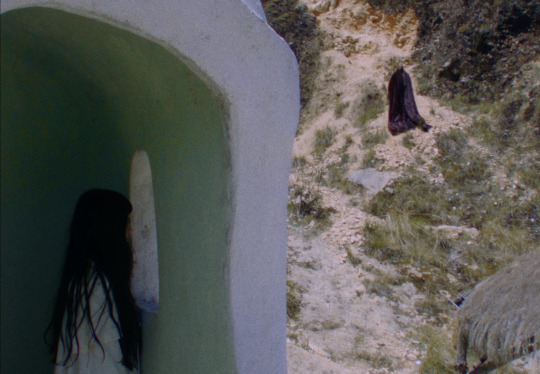
SILY: How involved were you in the visual identity of the record?
FR: The record cover, I kind of designed it.
IGF: [laughs]
FR: I didn't take the photo or anything like that, but I used Pages to design the [linework.] That came together pretty quickly based on something I drew up.
IGF: We were in Bolivia when we did [the album photos.] We wanted to have a couple amazing friends, photographers and visual artists--and I really wanted to have South American artists--involved in the images. A friend of mine took the pictures, and we went to a very beautiful mountain where I grew up, and to the market, these very crazy places in Bolivia. We did make a mood-board to guide our friend of how it could be, more or less. Not in all of the pictures, but in the cover picture, he really captured something we were longing for. It's full of the world around you, the territories that were talking to us so loudly. For the [video] for "DESTEJER", I asked someone in Bolivia who I didn't know but who I had been following for a while, [Espectador Domesticado]. The concept behind the concept, in Cochabamba, the lake, was, "How does the new generation perceive this music?" We talk all the time about ancestors and the past, but I also want to think about the future. These are ancestors of the future, 23 years old. So we did develop a little bit together, but I gave [the director] a lot of freedom to interpret the territory the way he wanted. We did help him with edits, but I left as much space as possible for his voice.
FR: For "TURBULÊNCIA", we were thinking, "We need to put out another single. Should we make a video? Should we?" Ibelisse and I are part of a collective called Molk Factory, and one of our collective members who is a wonderful video artist who works with projection and light, we asked her whether she wanted to make a video with us real quick. We added some ideas between all of us and came up with the idea of using very open space with movers and dancers. We wanted to deal with the dissonance of what the song is talking about. We wanted to tear apart or unweave, if I can use that word--
IGF: Destejer. [laughs]
FR: Destejer. We very quickly put the task at hand. "Let's mix this video." We filmed it in about 10-12 hours with the help of Marc Riordan, who used to live in Chicago. Incredible drummer, incredible pianist, and now he's really busy with a film living in L.A. He was visiting to play some shows with me and was the main camera operator, which is such a blessing because he's really good at thinking about cameras and how all of that works, because I have no idea. Within a 24-hour period of actual time, that video was formed. It was playful, immediate. We didn't think about too hard. It just came out. We were really happy with it.
IGF: The tricky part is it had digital post-production. When does digital [manipulation] become a response to what we were saying, not just a trick, but serve something more than a trick or a gimmick? It was a bit of a conversation with [director] Noralie [van den Eijnde], because it's called "TURBULÊNCIA", or "turbulence," with things out of control sometimes. How do we listen, and how do we use our hands to carve a new knowing together? Who is giving me the voice, and is that why the hands are moving my face? Is that the ancestors? This counterpoint between who is moving who: Is something moving the body, or is the body open enough to be losing its shape?
SILY: It's the colonizer versus the colonized, external forces affecting our perspective of things versus something more internal.
IGF: I think you're right. At some point, it's taking ownership of these two forces--the duality--and what do you do with it after just being the victim of it. "DESTEJER" was the opposite. We perform, we read the music, and there was this amazing rhythm happening, but we're just looking at the water really quietly. We were totally ADHD and wanting things to happen, but the filmmaker was like, "No! Everything is already happening in the forest, in the lake, in the water." We just had to listen and be there. Both videos are totally different, but in a way, they're totally similar in the essence of making yourself available and take ownership of the things that live within you while dealing with them and their contradictions.
Tour dates:
5/30: de Doelen, Rotterdam, NL
5/31: Tolhuistuin, Amsterdam, NL
6/1: C.A.L.L. F.E.S.T.I.V.A.L., Amsterdam, NL*
6/3: Kampnagel, Hamburg, DE
6/4: 90mil, Berlin, DE
6/6: Stadtgarten, Köln, DE
6/7: Church of Sound, London, UK
6/8: Pabfest, Île de Batz, FR
*Members of the MESTIZX band perform
youtube
#interviews#live picks#ibelisse guardia ferragutti#frank rosaly#gumo#international anthem#nonesuch#ben lamar gay#bill mackay#mikel patrick avery#marta warelis#saskia ludden#chris doyle#marc riordan#noralie van den eijnde#de doelen#tolhuistuin#kampnagel#stadtgarten#church of sound#pabfest#mestizx#international anthem recording company#nonesuch records#thurston moore#ryley walker#dave rempis#matana roberts#¡Todos de Pie!#tito puente
0 notes
Text



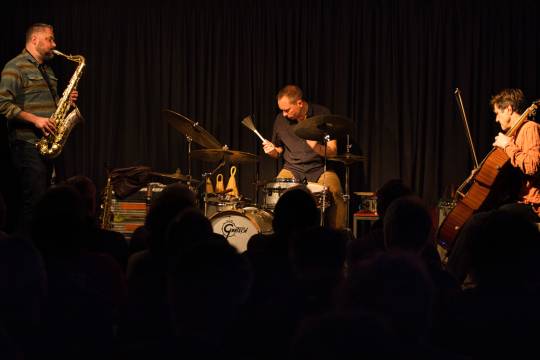
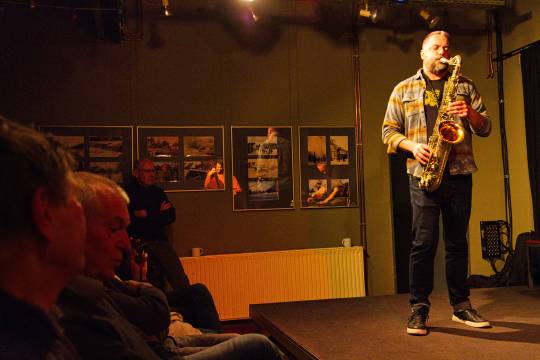

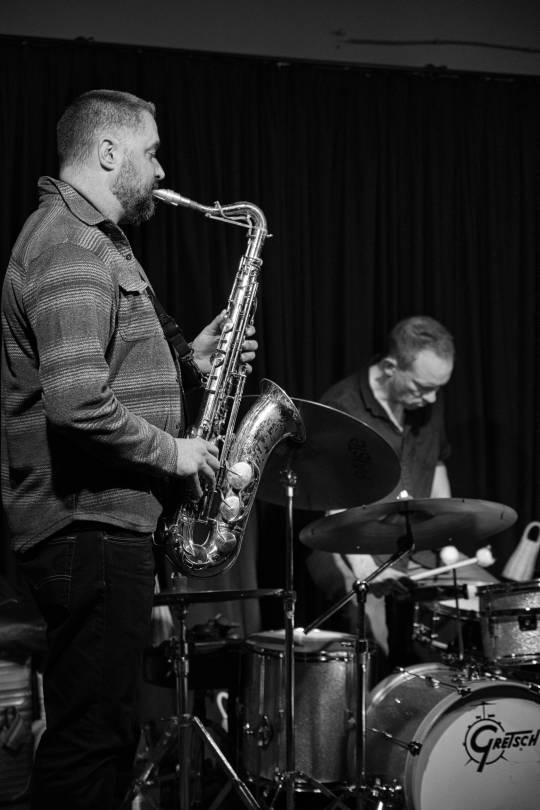
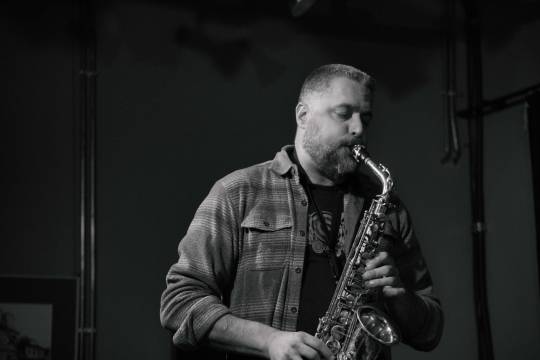




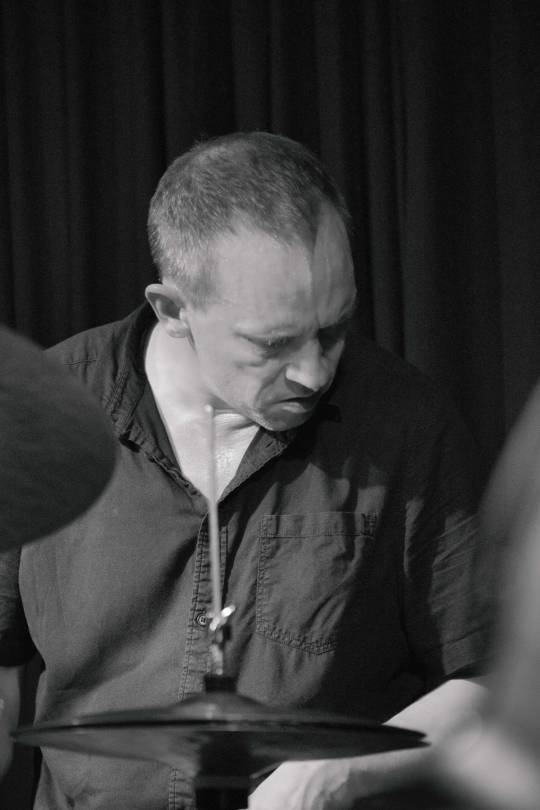




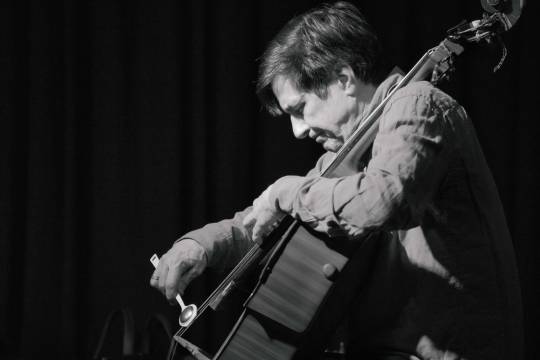



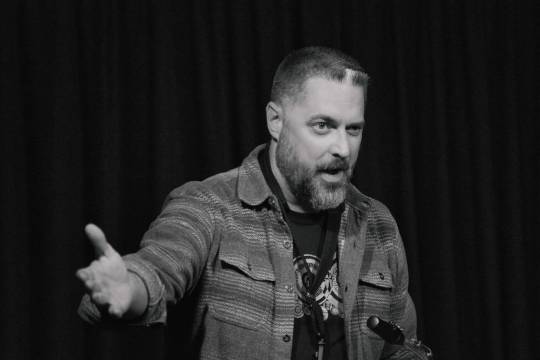


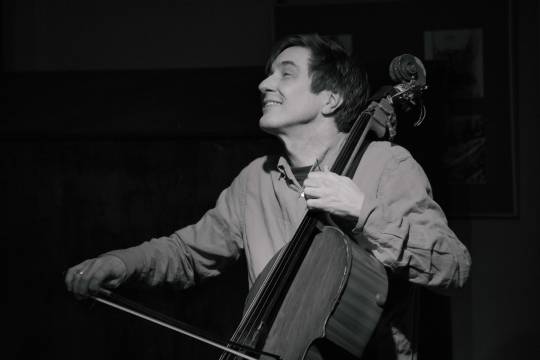

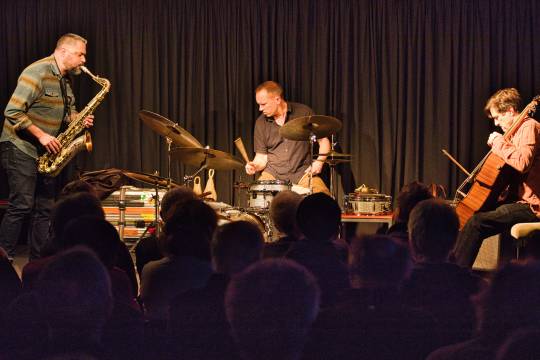


Ballister
10.3.2024
Ballister sind Dave Rempis (sax), Paal Nilssen-Love (dr) und Fred Lonberg-Holm (cello). Eine Supergroup der improvisierten Musik nach langen Jahren wieder in "einem der besten Clubs" (Danke für das Kompliment an Dave). Der vollbesetzte W71 mit seinen auch weit angereisten Zuhörern war aus dem Häuschen. War das noch Jazz oder ist das schon Rock...
...fragt sich
Schorle
1 note
·
View note
Audio
Listen/purchase: MIMIKAKI by Dave Rempis / Elisabeth Harnik / Fred Lonberg-Holm / Tim Daisy
2 notes
·
View notes
Text
Rempis / Daisy: Sugar Maple 2020
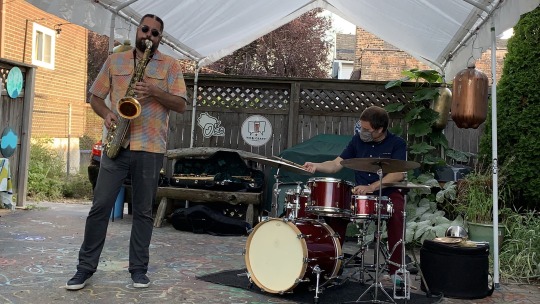
Live music...in 2020?! Esteemed shredders/improvisers and friends, Dave Rempis & Tim Daisy, have kept me sane during this pieceofshit summer by playing a handful of duo sets at Milwaukee’s best beer/spacemusic hub The Sugar Maple. Catharsis via sounds moving through air, what a novel concept. Thanks, Dave/Tim! Their most recent release Dodecahedron is amazing, and features some heavy guests. Buy it. Dave Rempis / Tim Daisy 8.30.2020 @ the Sugar Maple Milwaukee, WI set1 I set1 II set2 I set2 II Dave Rempis – alto / tenor / baritone saxophones Tim Daisy – percussion / electronics streaming | download
3 notes
·
View notes
Text
Free The Jazz #104 [for Alan Bishop]
Welcome back to FTJ [phase 2?]. It’s been a while.
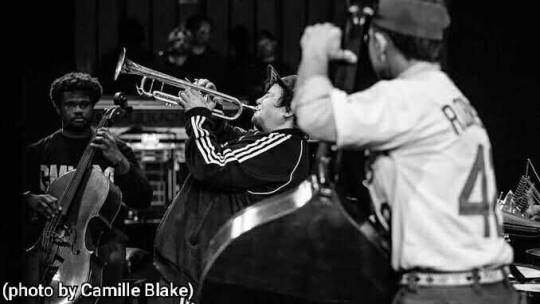
1 - Jaimie Branch - Prayer For Amerikkka Pt. 1 & 2 (from "Fly Or Die II: Bird Dogs Of Paradise", 2019 International Anthem)
2 - Kjetil Møster / Jeff Parker / Joshua Abrams / John Herndon - Anicca (edit) (from "Ran Do", 2017 Clean Feed)
3 - Irreversible Entanglements - Homeless/Global (edit) (from "Homeless/Global", 2019 International Anthem)
4 - أحمد [Amed] - Farah ‘Alaiyna (Joy Upon Us) (edit) (from "Super Majnoon (East Meets West)", 2019 Otoroku)
5 - Kuzu - Spilled Out (edit) (from "Lift To Drag", 2019 Medium Sound)
As previously, new mixes debut over at 8K, before finding their way to the FTJ page at mixcloud, or simply click play down below. And as always, play it freakin’ loud!
#jazz#free jazz#free the jazz#8k#8k.nz#alan bishop#jaimie branch#kjetil møster#camae ayewa#pat thomas#seymour wright#dave rempis#tyler damon#tashi dorji#jason ajemian#chad taylor#jeff parker#john herndon#joshua abrams#tortoise#luke stewart#moor mother#international anthem#clean feed#mixcloud
4 notes
·
View notes
Text
Diez de... agosto de 2022 (I) Por Pachi Tapiz [Grabaciones de jazz]
Diez de… agosto de 2022 (I) Por Pachi Tapiz [Grabaciones de jazz]
Inauguramos la sección Diez de… de Pachi Tapiz con el repaso a diez grabaciones (más o menos) de lo más variado. Ken Vandermark, Perico Sambeat, Dave Rempis, Manuel Mengis, Juan Vinuesa, Wadada Leo Smith, Günter Baby Sommer, Moisés P. Sánchez, otok o Count Basie acompañado de cuatro vocalistas de primera son los protagonistas de las primeras grabaciones que pasan por la sección. Cada día diez del…

View On WordPress
#Aerophonic Records#Andrew Cyrille#Annie Ross#Antonio Lucaciu#Anzic Records#Audiographic Records#Claire Rousay (percusión); Ken Vandermark#Count Basie#Damon Locks#Dave Lambert#Dave Rempis#Elisabeth Harnik#Fabian Almazan#gene bertoncini#Günter Baby Sommer#Günter Baby Sommer And The Lucaciu 3#Hamza Touré#Han Bennink#Hans-Peter Pfammatter#Ike Sturm#Intakt#Jack DeJohnette#Jason Roebke#Javier Hagen#Joe Williams#Jon Hendricks#Josh Berman#Juan Vinuesa#Juan Vinuesa Quartet feat. Paul Stocker#Julien Catherine
0 notes
Text
I went to my first free jazz concert yesterday and it was AWESOME!
I got to see Dave Rempis, Fred Lonberg-Holm, and THE PAAL NILSSEN-LOVE LIVE!!
2 notes
·
View notes
Text
New Music....Clark:Rempis:Roebke Live at The Hungry Brain
New Recording- Clark:Rempis:Roebke Live at The Hungry Brain
//bandcamp.com/EmbeddedPlayer/v=2/album=3466198062/size=large/bgcol=ffffff/linkcol=0687f5/ I was lucky enough to travel to Chicago in mid 2014 to play and hear some great music. This recording is a documentation from that trip and a set that I played at the Hungry Brain featuring the great saxophonist Dave Rempis and the great bassist Jason Roebke. It was an honor to get to play with both of…
View On WordPress
#chicago#dave rempis#free improvised music#jason roebke#jazz#Live at the Hungry Brain#music#richmond#scott clark#The Hungry Brain
1 note
·
View note
Text
Dave Rempis Percussion Quartet — Harvesters (Aerophonic)

Harvesters by Rempis Percussion Quartet
Saxophonist Dave Rempis is joined on Harvesters by bassist Ingebrigt Håker Flaten and two drummers, Tim Daisy and Frank Rosaly. The group last recorded in 2013, and the double CD is from their first tour of France in March 2023, a live evening at Le Petit Faucheux in Tours (The English translation of the venue’s name is “Little Daddy Long Legs”—Harvester is another name for the spider). Rempis and company spent a week visiting five venues in France. The set from Tours, their first night in the country, is extraordinary music-making.
Two pieces are on the first CD. “Everything Happens to You” is a half-hour long piece that presents an interesting reversal. It begins with trills and shrieks, out of which, after considerable free improv, a tune emerges. This setup is the opposite of traditional jazz performances, where the tune begins the proceedings to be followed by solos. The drummers create a welter of polyrhythms, rather than interlocking, complementing and responding to each other. Listening again, one can find scraps of the melody that eventually appears: Crafty construction and passionate execution.
Trumpeter Jean-Luc Cappozzo guests on “The Exuberant Aubergine,” playing high, breathy, glissandos while Rempis once again plays fleet trills. It is a slow tempo piece that is also a slow burner. The percussionists, for the most part, keep their powder and the dynamic level low. Cappozzo unfurls a wide-ranging solo and Rempis responds with bent notes and high glissandos of his own. Håker Flaten contextualizes the harmony with scalar passages and chromatic passagework. Cappozzo and Rempis trade riffs, sometimes imitating one another and at others doing their own thing. Duet becomes a trio with bass notes double-timing, moving through all the registers of the instrument. Solos are exchanged in the next section, with the percussionists pressing the action with muscular playing. Midway through, the surface calms, bass notes repeated instead of the previous scalar movement, misterioso melodies from trumpet and saxophone, and a general slowing down. Pops, clicks and slurps from the winds are responded to by accentuations in the percussion. A gradual accelerando and the return of Rempis’ trills signal a return to the demeanor of the opening volleys. The intensity ratchets up, with the drummers becoming more prominent than the winds, despite their altissimo held notes. Once again, riffs are traded, with a call and response between Rempis and Cappozzo responded to by intense playing from the rhythm section. The conclusion sees the drums move back to a simmer, the bass playing repeated notes against a decrescendo by the winds. Exuberant indeed.
CD 2 chronicles the second set. “Spooky Action” begins with a drum duet that introduces a syncopated rhythmic pattern. Rempis is buoyed by the drumming to soaring solos. Håker Flaten adds yet another layer of metric ambiguity. The rhythm section maintains its energetic performance, Rempis exploring and melding various melodic cells of material, creating flurries of ostinatos. Once again, a soulful melody is saved for late in the piece. At the last, the drums drop out, the bass plays repeated pitches, and Rempis builds the repeating patterns into a caterwauling climax, with the percussionists only then edging back in. Rempis concludes with a bluesy cadenza, punctuated by aphoristic gestures from the other players.
“Little Fascists” begins with Cagean percussion improv. Rempis enters similarly, with disjunct riffs and rasping, sustained pitches. He then builds overtones with perfectly tuned harmonics. Håker Flaten contributes a long high register arco trill, adding to the sense of experimentation. Rempis adds keening wails at the end of the piece. While the free jazz blowing on other tunes is exciting, “Little Fascists” has a distinctive sound world that is fascinating.
The final tune, “Fat Lip” opens with a bass solo in which harmonics are juxtaposed against a pizzicato solo that ranges the whole instrument. Håker Flaten has been a keen collaborator throughout the concert, and his solo brings this style to the fore. Rempis joins him with an undulating melody that begins brawny and slow and proceeds to mercurial runs. The drummers alternate between pulsation and freely constructed fills. Rempis returns to his mid-register melody, embellished with quick scales. The saxophonist savors an intervallic sequence, tweaking it here and there with half step variations. His solo quickens and takes up a stentorian tone. The rest of the group recognizes his intentions, pressing forward and creating a sweltering density. With raucous howls and undulating lines, Rempis fragments “Fat Lip’s” melodic contours. He eventually settles on two short riffs, that he repeats as the drummers add still more fills and Håker Flaten plays a modal ostinato. The conclusion is a decrescendo with a sizzle of cymbal at the end.
One hopes that more of the France tour might be committed to disc. This is Aerophonic’s tenth anniversary, and there are few better ways to celebrate than more of Rempis’s Percussion Quartet.
Christian Carey
#dave rempis percussion quartet#harvesters#aerophonic#christian carey#albumreview#dusted magazine#dave rempis#Ingebrigt Håker Flaten#tim daisy#frank rosaly#jazz#Jean-Luc Cappozzo
5 notes
·
View notes
Text
youtube
Dave Rempis / Tim Daisy with special guest Jason Adasiewicz
Sugar Maple - Milwaukee June 18, 2023
video courtesy of Brag Milwaukee https://www.youtube.com/@bragmilwaukee2947
0 notes
Audio
the new show hits wlur at 8pm and we'll be giving a little extra attention throughout to mark lanegan, who passed away earlier this week. tune in or catch up with last week's show below!
no love for ned on wlur – february 18th, 2022 from 8-10pm
artist // track // album // label luluc featuring j mascis // me and jasper // sculptor // sub pop snail mail // adore you (valentine demo) // adore you (valentine demo) - single // matador local tourist // undone // other ways of living // lovers weekend cat stevens // i wish, i wish // harold and maude soundtrack (remastered) // universal cat power // here comes a regular // covers // domino * curtis harding // hopeful // if words were flowers // anti * big thief // simulation swarm // dragon new warm mountain i believe in you // 4ad * picastro // man has been struck down by hands unseen // i've never met a stranger cassette // (self-released) lofi legs // thinking of you // leg day // we were never being boring great lakes // i'm not listening // contenders // happy happy birthday to me * research // delusion loop // the post modern always rings twice // better than your records emma-jean thackray // say something (live on later with jools holland) // yellower, volume one ep // movementt joel vandroogenbroeck // rocks // far view // drag city graham collier featuring feat. harry beckett and ed speight // red sky at night // british conversations // my only desire robbie lee and lea bertucci // image mirror // winds bells falls // telegraph harp dave rempis and avreeayl ra // fire and ash // bennu // aerophonic irreversible entanglements // lágrimas del mar // open the gates // international anthem gene russell // me and mrs. jones // talk to my lady // black jazz i-sef u-sef // alone again // consistency cassette // preference golden browne featuring yu // something // golden browne // hipnott seba kaapstad featuring quelle chris // our people // konke // mello music group akai solo // color of conquerors // ride alone, fly together // novelty kitty craft featuring yoshinori aoki // tonight // lost tapes // takotsubo marinita precaria // tú pa qué // no me miréis // elefant the convenience // kiss me in heaven // accelerator // winspear * teleman // storm chasing // sweet morning ep // moshi moshi * don't // your brother // lightning slow // dreamy life
* denotes music on wlur’s playlist
2 notes
·
View notes
Text


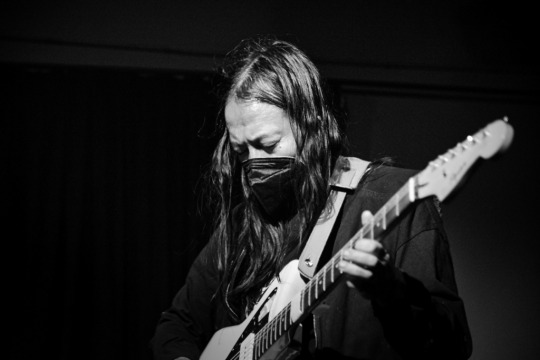



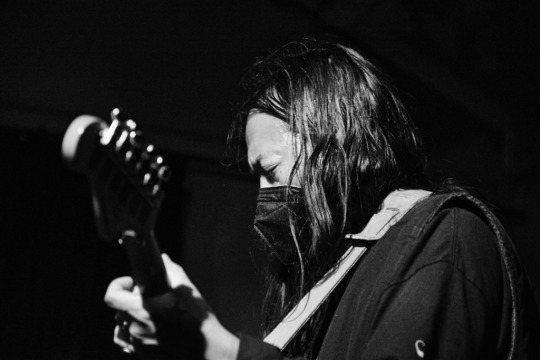



KUZU im Club W71
KUZU bedeutet HALLO. Und es war ein großes Hallo, das Dave Rempis (sax), Tyler Damon (dr) und Tashi Dorji (g) dem bunt gemischten Publikum von Free Jazz- bis Hard Rock-Fans boten. Ein sattes Brett mit starker improvisierter Musik. Genau richtig in dieser seltsamen Zeit mit 2G und Maskenpflicht im Saal
findet
Schorle
2 notes
·
View notes
Audio
Listen to: Ostro by Mark Feldman / Dave Rempis / Tim Daisy
0 notes